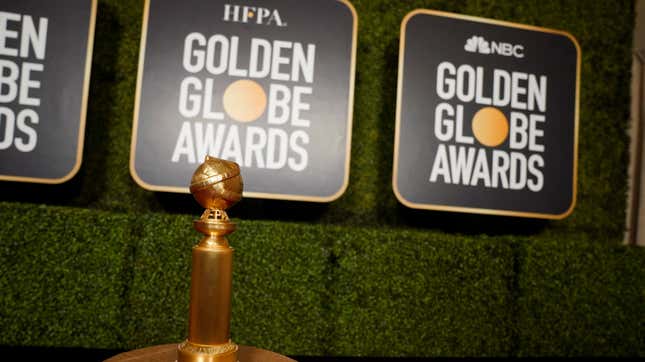
So, that happened. It’s always happening.
Working in the entertainment industry means awards season is akin to the Super Bowl. Using that same Super Bowl analogy, the Hollywood Foreign Press Association (HFPA) committed a significant fumble during the 4th quarter just one week prior to their awards ceremony, the 78th Golden Globe Awards. In a scathing report, it was revealed that the HFPA did not have any Black members.
An array of A-list stars including Ava DuVernay, Viola Davis, Sterling K. Brown, Kerry Washington, Jurnee Smollett, Gina Prince-Bythewood and more joined an initiative called #TimesUpGlobes to call out the lack of representation accompanied by copy noting, “a cosmetic fix just isn’t enough.” On the eve of the ceremony, yet another report resurfaced that a Black applicant from the UK named Samantha Ofole-Prince had been rejected from the association in 2013 because she didn’t fulfill the bylaws requirements, a decision which caused some internal controversy (with another member claiming it was actually because she didn’t receive “sufficient votes”).
In response to the #TimesUpGlobes callout, the HFPA released the following statement: “We are fully committed to ensuring our membership is reflective of the communities around the world who love film, tv, and the artists inspiring and educating them. We understand that we need to bring in Black members as well as members from other underrepresented backgrounds, and we will immediately work to implement an action plan to achieve these goals as soon as possible.”
Prior to the ceremony, the HFPA confirmed they would “address this in [the] show on Sunday.” The evening’s hosts, Tina Fey and Amy Poehler naturally “addressed” it with a few self-aware jokes, but it was definitely the HFPA itself that most were waiting to hear from.
As I expressed in the above piece following the initial “no Black members in the HFPA” news, the automatic reaction to this constant erasure and disrespect is to disengage from mainstream (white) awards culture—a response that is complicated by the desire to celebrate our Black talent every chance we get because of how rare it is we’re recognized on significant levels.
I am thrilled for the Black talent who won on Sunday night, including but not limited to Daniel Kaluuya (Best Supporting Actor – Motion Picture; Judas and the Black Messiah), John Boyega (Best Supporting Actor – Series, Miniseries or Television Film; Small Axe), Andra Day (Best Actress – Motion Picture – Drama; The United States vs. Billie Holiday), Jon Batiste (Best Original Score – Motion Picture; Soul), co-director Kemp Powers (Animated Feature Film; Soul) and the late Chadwick Boseman (Best Actor – Motion Picture – Drama; Ma Rainey’s Black Bottom).
In fact, I cannot begin to understand the inner bittersweet dichotomy it is to grapple with the elation of winning a prestigious award while being acutely aware of its continuously problematic background. As a Black writer working in digital media, it’s difficult to ignore the obvious—hell, as someone who wants to successfully work in the Hollywood industry as a creator, I cannot ignore the obvious.
Additionally, I am so excited for organic creators such as Laron Hines (and the smart babies JaBria, Zan, Lori, etc.) of the TikTok series “Are You Smarter Than a Preschooler” being able to elevate their platform through a segment on the Globes. The “Black Panther” answer (and the young tribute to the late Chadwick Boseman) had me in the feels. Plus, I’m wholly aware of the honor of Spike and Tonya Lewis Lee’s children Satchel and Jackson to have been named the 2021 Golden Globe Ambassadors.
What I don’t want to fall into yet again is the white guilt-based trap of lapping up the crumbs given to us every few trendy years and forgetting the fact that the true problem—abolishing the white supremacist Hollywood structure—cannot be washed away with a few history-making statuettes (for example, on Sunday night, Day became the second Black woman to win the Golden Globe for Best Actress - Drama, after Whoopi Goldberg won for The Color Purple...thirty-five years ago. Enough said).
In a public-relations-colored, robotic and seemingly throwaway statement, the HFPA leaders quickly addressed the controversy onstage—on the last day of Black History Month, no less.
“We must ensure everyone from all underrepresented communities get a seat at our table and we are going to make that happen,” former HFPA President Meher Tatna (India) said.
“While we celebrate the work of artists from around the globe, we recognize we have our own work to do,” HFPA Vice-President Helen Hoehne (Germany) added. “Just like in film and television, Black representation is vital. We must have Black journalists in our organization.”
“That means creating an environment where diverse membership is the norm not the exception,” current HFPA President Ali Sar (Turkey) said. “Thank you, and we’ll look feared to a more inclusive future.”
...Sure.
I guess we’ll see if this finally goes beyond empty social media hashtags and PR statements while transitioning to actual actionable items. Overall, as Ellen Pompeo said in her call to her white peers, “What we can not do…is leave this problem up to the Black community and all our communities of color to fix. This is not their problem, it’s ours.” Shout-out to last night’s Cecil B. DeMille Award honoree Jane Fonda for using her platform (continuously) to reiterate just that.
The Golden Globes table has historically been touted as one of the most fun of the series of prestigious award ceremonies, with its infamous open bar and cocktail party. That table is looking less and less fun, though, with each frustrating fight toward true inclusion. Besides, what’s a seat at a table where you don’t feel welcome? It’s ultimately worthless. Perhaps that table—and many other exclusive tables in Hollywood—needs to be shaken, flipped and never set up again.
For a full list of winners at the 78th Golden Globe Awards, please head to goldenglobes.com.

